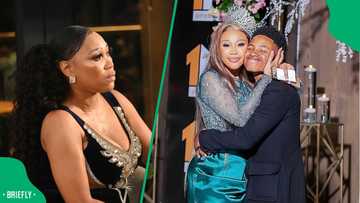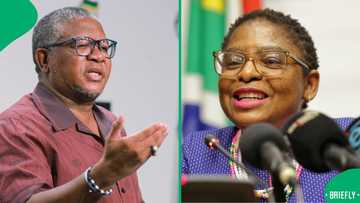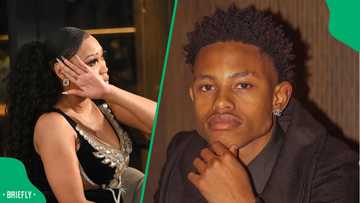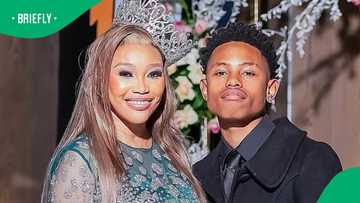Genghis Khan's children: How many kids did the Great Khan have?
Genghis Khan founded and was the first Great Khan of the Mongol Empire. This dynasty eventually became one of the largest empires in history thanks to Genghis Khan's children, who ensured the continuation of his legacy after his death.

Source: Getty Images
TABLE OF CONTENTS
Genghis Khan's legacy was vast and not limited to his political power but also to his descendants. He fathered several legitimate and illegitimate children through his wives and concubines and uncontrolled affairs with whoever he desired. It is alleged that about 16 million men alive today are descended from the Mongol ruler.
Profile summary
| Full name | Genghis Khan |
| Aliases | Temuchin, Jenghiz Khan, Temüjin, Chingis, Khan, Jinghis Khan, Ching-gis Khan, Chinggiss Khan |
| Date of birth | 1162 |
| Place of birth | Near Lake Baikal |
| Date of death | 18 August 1227 |
| Age at death | 65 years old |
| Parents | Yesugei and Hö'elün |
| Spouse | Börte (main wife) |
| Children | At least four sons |
Exploring Genghis Khan's children
The total number of Genghis Khan's kids is subject to historical discussion because there are no accurate chronicles from that era. Genealogical studies show that the Mongol Majesty had numerous offspring.
Despite this, there are different opinions about Genghis Khan. As published in Eurasia Review, Luvsanvandan Bold, the Mongolian Ambassador to Belgium and the European Union, said the following:
Genghis Khan symbolises globalisation and unification. He initiated the first steps toward global connectivity and is one of the most significant figures in history. However, we must analyse him as a medieval leader, not through the lens of the 21st century.

Source: Original
How many kids did Genghis Khan have?
As Mongolian Store published, Genghis Khan fathered at least four sons with his main wife, Börte. Most of the children Genghis had with Börte ruled in various capacities. Below are their details:
Jochi
Jochi was the first of Genghis Khan's sons with Börte and was allegedly born around 1181. There have been controversies over his paternity, as it has been suggested that he might not be the Great Khan's biological son. The reason is that the Merkit tribe captured Börte at some point, and the new man she was handed over to before her rescue allegedly impregnated her.
As Britannica published, Jochi was a capable military leader who participated in some of the earliest Mongol conquests. Unlike his father, he favoured showing mercy and diplomacy over avoidable slaughter.
Jochi passed away before his father in February 1227. Rumours circulated that he was at loggerheads with his brother, especially Chagatai, over his legitimacy.
Chagatai
Born around 1183, Chagatai was renowned for supporting strict allegiance to Mongol customs. After his father's death, Chagatai acquired control over Central Asia, which became Chagatai Khanate. This khanate played a cultural and political role as it connected Mongol, Turkic, and Islamic influences without compromising Mongol traditions.
According to Britannica, Chagatai died in 1241, but his direct bloodline lasted only a few centuries after him. His Central Asia Khanate survived until the late 17th century to become a trade and cultural centre, especially under Timurid influence.
Ögedei

Source: Getty Images
In a post published by Britannica, Ögedei was born in 1185 and appointed by Genghis Khan as his successor, suggesting he was held in high regard. He was renowned for adopting diplomatic skills and giving more indulgent interpretations of Mongol law. He developed the empire into China, where he founded Karakorum as the capital.
His reign was not all roses and no thorns. He had to contend with the empire's immensity, prompting frequent quelling of uprisings and steering the complicated succession politics. Ögedei's death in 1241 led to a pause in the Mongol Empire's rise with internal strife as to succession.
Tolui
Tolui, born around 1191, was the youngest of Genghis Khan's primary sons. He was rumoured to be most loyal to his father and participated with great courage in numerous crusades and battles.
After Genghis Khan's demise, as Britannica published, Tolui acquired control of the Mongol homeland. He supported Ögedei's rule, and some historical accounts tell how he sacrificed himself for Ögedei's health.
Tolui died in 1232, but his bloodline became one of the most powerful. His wife, Sorghaghtani Beki, was crucial in their sons' rise to supremacy in Mongol history.
Other Genghis Khan's children

Read also
Sonia Mbele's son Donell Mbele granted bail of R1000, reactions mixed: "That amount is ridiculous"
Genghis Khan had kids with other wives and concubines. The Sun reported that he had daughters like Checheyigen, Tümelün, Al-Altan, Qojin, and Alakhai Bekhi, who were famously married off to forge political coalitions.
Who are Genghis Khan's grandchildren?
Xuebietai, Suigedu, Mukha Khan, and Yesubuhua are reportedly Tolui's children, while Jochi gave birth to Muhammed, Berkhechir, Chilagun, Chimbay, and Sinqur, among others. Ögedei had Kadan, Khochu, Godan, and Melig. Chagatai also had Baidar.
These grandchildren were also instrumental in expanding the Mongol Empire into various parts of the world.

Source: Getty Images
Frequently asked questions
The greatness of Genghis Khan has led to several questions about his personal and political influence. Below are a couple of such inquiries and adequate responses to them:
- Who was Genghis Khan's favourite son? The Emperor appeared to be fond of Ögedei.
- Was Genghis Khan older than Jesus? Genghis Khan is not older than Jesus Christ. Khan was born around 1162 AD.
- How many full siblings did Genghis Khan have? Genghis Khan had three full brothers and two half-siblings.
- Where are the Mongols now? The Mongols are found mostly in Central Asia nowadays.
- Who were Genghis Khan's wives? The total number of Genghis Khan's wives has not been confirmed but historians believe he had 44 wives and concubines. Some historians estimate he had hundreds or even thousands of women in his kingdom.
- Are there any living descendants of Genghis Khan? Genghis Khan's genetic legacy is spread across China, Mongolia, and other parts of Asia.
- What religion was Genghis Khan? He was a Tengrist who ensured religious tolerance under his reign.
- What language is spoken in Mongolia? Mongolian is the official spoken language of Mongolia.
Genghis Khan's children and subsequent progeny ensured their father's legacy endured several centuries of Mongolian world power. The Emperor left the world with a genetic footprint that lingers several millennia later.
READ ALSO: El Cuco: Everything you should know about the spooky myth
As published on Briefly.co.za, El Cuco is a legendary figure in Latin American folklore, often depicted as a shape-shifting monster or ghost that preys on disobedient children.
It serves as a cautionary tale to teach good behaviour. With indigenous and European roots, El Cuco has evolved into a cultural icon, symbolising the power of myth and legend.
Source: Briefly News





